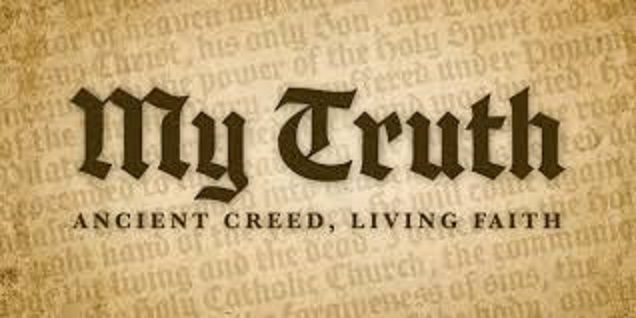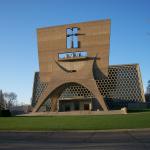One Sunday, not too many months ago, I decided to pay close attention to the words of the Nicene Creed when it showed up as it does every Sunday morning in the Episcopal liturgy right after the homily. People usually pay about as much attention to the text of the Creed as they do to the words of the Lord’s Prayer—but try it sometime. “Wow,” I thought as I said the words, “there’s some pretty crazy stuff in here. I’m not sure that I believe all of this.”

I mentioned this to the monthly Adult Christian Education seminar that I led after the service; one woman said that she took “comfort” in the fact that when she recites the Nicene Creed, she’s reciting the same words that certain Christians have been reciting for over 1500 years. I confessed that I didn’t know why a list of beliefs that hasn’t changed in over 1500 years would be “comforting,” but there’s no accounting for taste. I also mentioned that comfort is vastly overrated in my opinion, especially in the life of faith, but that didn’t seem to budge her from her preference for religious truths that are set in stone.
The Nicene Creed was on my mind that Sunday because it had been part of the discussion in one of my seminars with a bunch of freshmen the previous week. In the interdisciplinary course I teach in, we were in the middle of early Christianity; the readings for the day were essays about two of the central doctrines of the Christian faith from two fourth-century theologians: Hilary of Poitiers on the Trinity, and Athanasius on the Incarnation. And despite my best efforts, my eighteen freshmen—many of them the products of twelve years of Catholic parochial education—had little to say.
I reminded the students of the underlying issue at the heart of Athanasius’ discussion: How are Christians to understand the Second Person of the Trinity? I also reminded them of the various competing possibilities raised by my theologian colleague and teaching teammate in his setup lecture a few days earlier. Sabellius, Ebion, Arius, the Monophysites, the Docetists, and many others were jockeying for position with their varying suggestions along with the eventual winning proposal promoted by Athanasius and others, the position ultimately incorporated into the Nicene Creed:
We believe in one Lord, Jesus Christ, the only Son of God, eternally begotten of the Father, God from God, Light from Light, true God from true God, begotten, not made, of one Being with the Father. Through him all things were made.
The Creed’s claim concerning Jesus is that he was not just a human being with special divine favor, nor was he a divine being pretending to be human, nor was he less than God the Father, nor was he some strange mixture or brew of divinity and humanity stirred together in a new ontological concoction. He was “begotten,” not “created.” “Whatever,” my students’ faces were saying. “Who gives a shit?” they were thinking. “’Is this going to be on the test?’ they were wondering. So, I asked them a different question.
“Suppose you were a fourth-century Christian woman or man,” I began. “Not a theologian or anyone special, just an ordinary, garden variety person claiming to be a Christian. All you want to know is ‘How should I live today in real time, at my job, with my family and friends, interacting with my neighbors and strangers, as a Christian? What does this faith I profess require of me today?’ Would either of the texts we read for today provide such a person with any practical guidance? Would reading Hilary or Athanasius help an aspiring Christian figure out how to live her or his faith more effectively and fruitfully?” No one said anything immediately, but several students began slowly shaking their heads. “I don’t think so,” one of them finally offered tentatively. Then what is the point? Who cares? Why are we wasting our time with this?
I have told my freshmen before that “So what?’ is the best philosophical question one can ask, but they didn’t expect me to actually ask it in the context of matters that many of them have been taught involve one’s eternal soul.
I recently finished reading Sara Miles’ Take This Bread, a memoir account of what a faith commitment to Christianity looks like to a dedicated left-wing progressive atheist who found herself knocked on her ass by something greater than herself, uninvited and unexpected, after wandering into a Sunday service in a San Francisco Episcopal church. Unencumbered by doctrine, dogma, or what she was “supposed to believe,” Miles frequently found herself running afoul of religious expectations and commitments as she sought to organize a food pantry in her new church along the lines of generosity described by Jesus, asking—in the words of one of her friends and partners in irreverence—“What the fuck would Jesus do?”
Her church, Saint Gregory’s of Nyssa Episcopal, pastored by a couple of progressive priests who over the years had crafted an unusual and creative Sunday liturgical celebration within the very flexible boundaries of The Book of Common Prayer, did not include the Nicene Creed as part of its services. Miles never encountered the Creed until she accompanied Paul, one of St. Gregory’s associate priests, one summer to an Episcopal retreat in North Carolina. “What was that Creed thing?” she asked the priest after reading it for the first time in a service. “It’s like saying the Pledge of Allegiance in second grade!” Paul, remarkably, told her the unvarnished truth.
It’s basically a toxic document, set up to standardize belief and overturn heresies and draw a sharp line between us and them.
Paul had similar things to say during a later conversation with Sara as they talked about various ways, over the centuries, that religions have sought to control access and membership; in doing so, we seek to tame and domesticate the divine. “’It’s kind of crazy talk,’ said Paul once, trying to explain the official rules of Eucharist to me. ‘It only happens if the right person with the right stuff says the right words.’” But Sara, observes,
“Rightness” was always more about licensing requirements than about God; the human lines drawn to regulate priestly ordination extended and wrapped round the Eucharist like barbed wire, binding the sacrament to rules about who could be a valid, official celebrant and who could be excluded.
One of the most persistent stumbling blocks to dynamic faith is the continuing attempts of religions folks from all sides of the spectrum to codify, systematize, and clarify that which, by its very nature, is resistant to all of the above. As Miles notes, each “think[s] they can control God like a piece of technology and that they’re the only ones who have the secret code.” But, of course, the divine is not manageable and cannot be domesticated.
There are times when I wish I had come to faith as Sara Miles did, with no prior experience, no preconceptions, and no one telling me from my earliest remembrance what I am supposed to believe. The truth that Miles encountered strikes me as clean, clear, and . . . well . . . true.
Rather than protecting me and sealing me off in a community of shared doctrine and rules, this truth thrusts me into the wildness of faith. I don’t need a creed to artificially connect me with other believers: It’s the ragged vastness of our different spiritual lives that points, for me, to a larger force . . . None of us, fundamentalist or radical or orthodox, Muslim or Jew or Christian, can adequately sum God up . . . Isn’t it reasonable to assume that there isn’t one single template for human belief, one single way to get it right?













